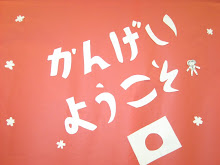Wednesday, February 3, 2010 A Block One Day
Notice to All Classes Regarding Extra Credit:
Attend the special film screening of
“Inside Hana’s Suitcase: The Story of a Suitcase that Traveled from Czechoslovakia to Auschwitz to Tokyo”
Saturday, February 20
5:00 to 7:30 p.m.
Arthur J. Schmitt Academic Center (SAC) #154
2320 N. Kenmore Ave.
Chicago, IL 60614
Free Admission
If Kimmel Sensei sees you there, you will get extra credit!
Useful website for hiragana and katakana and some other things as well:
http://66.110.202.42/peachstar/explorer/units/lrnactiv/hir-live/homepg.htm
JAPANESE 3 -- First period
Mrs. Yamasaki showed us an edited version of the Japanese New Year’s Eve music show、explaining the backgrounds of many of the singers and songs:
紅白歌合戦
Start learning plain neg forms of verbs:
Gr. III: しない、来ない(こない)
Gr. II: 食べない、起きない(おきない)
Gr. I: 会わない(あわない)、立たない(たたない)、座らない(すわらない)、読まない(よまない)、とばない、書かない(かかない)、およがない、話さない(はなさない)
Go over いいましょう 二
Homework: next photo story, regarding Miyo, in English
Be sure to register with Japanese site on Moodle.
JAPANESE 1 – Fifth period
Students answered questions out loud regarding assignment below.
What's on the menu each day at our restaurant?
日よう日 の メニュー{Menyuu} は コーヒー{Coffee} と おちゃ です。
月よう日 の メニュー は アイスクリーム{Ice cream} と おすし です。
火よう日
水よう日
木よう日
金よう日
土よう日
なに が すき です か。 なに が すき じゃ ない です か。
なに が おいしい です か。 なに が まずい です か。
Day-of-week subjects are adjective (‘Monday’s child is full of grace” is inspiration for this.
日よう日 の たつ は うるさい です。Sunday’s dragon is noisy.
月よう日
火よう日
水よう日
木よう日
金よう日
土よう日
おおきい、ちいさい、まずい、おいしい、あかい、かわいい、うるさい、むずかしい、やさしい、たのしい
Homework due tomorrow (students worked on it part of the time today in class): With a partner, design your own menu on a full-sized separate piece of paper. What do you like? What do you dislike? Your restaurant serves only foods you like. You’ll have (at least 3) categories, like food たべもの, drinks のみもの, dessertsデザート, etc., with at least 5 choices within each category. Give your restaurant a Japanese name and make your menu beautiful. Don’t forget prices in 円(えん)or ¥ (this is the international symbol). Plan for an exchange rate of 100 ¥ = $1 U.S.
Be sure to register with Japanese site on Moodle。
JAPANESE 2 Sixth Period
On board:
New verb for owning/raising pets : かって います。
犬(いぬ)が 五ひき います。
二コールさん は 犬 を 二ひき かって います。
Note placement of animal-counter just before verb, not before noun.
Also note special pronunciations of counters on page 60 of text.
Nouns of position (stroke order for となり 隣 and そば側 )
Were on board yesterday):
まえ 前 うしろ 後ろ うえ 上 した 下
ひだり 左 みぎ 右 となり 隣 そば側
Make up own sentences for positions of animals in location of your choice. We may use “circus,” particularly, in the future.
Homework: Page 36 in workbook
Be sure to register with Japanese site on Moodle。
Reminder: We all must be polite in the Japanese language classroom. Not only is it important in our lives in general – it is an essential part of Japanese culture. ください、おねがい します、ありがとう、すみません Are the most important words and phrases in Japanese.
JAPANESE 4 and AP – Seventh period
This class does not meet on Block One days.
About Me

- O.Kimeru
- M.A. 1992 from U. of Chicago; Japan Foundation Fellow in 1987-88; research fellow Yokohama City University; Japanese language teacher since 1991; also taught French (member American Association of Teachers of French), English as a Second Language (to students), methodology of teaching ESL (to Japanese high school teachers), English, Japanese history/culture, drama; in 2002 and 2004, listed in Who's Who Among America's Teachers; member of Chicago Sister Cities Osaka Committee, and chair of its Education Sub-Committee; vice-president Illinois Association of Teachers of Japanese; Payton H.S. World Language Department Chair from 2003-2007, under founding principal Mrs. Gail Ward; taught Japanese and coordinated Japan Exchange at Payton from 2003 to 2010; Japanese teacher at Burr Public School beginning August, 2010
Followers
Blog Archive
-
▼
2010
(88)
-
▼
February
(15)
- February 26, 2010 An Eight Period Day
- February 24, 2010 A Block Two Day
- February 23, 2010 A Block One Day
- February 22, 2010 An Eight Period Day
- February 19, 2010 An Eight Period Day
- February 18, 2010 A Block Two Day
- February 17, 2010 A Block One Day
- February 16, 2010 An Eight Period Day
- February 10, 2010 A Block Two day
- February 9, 2010 A Block One Day
- February 8, 2010 An Eight Period Day
- February 5, 2010 An Eight Period Day
- February 4, 2010 A Block Two Day
- February 3, 2010 A Block One Day
- February 2, 2010 An Eight Period Day
-
▼
February
(15)